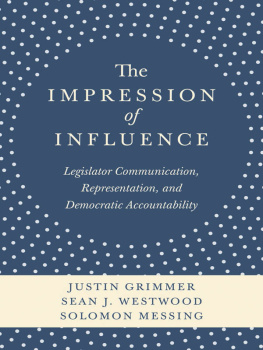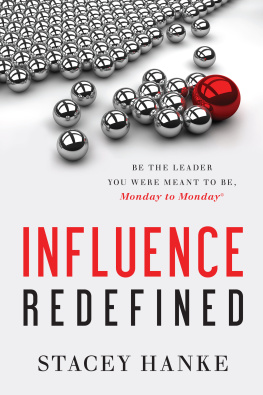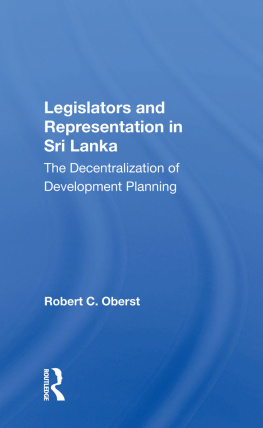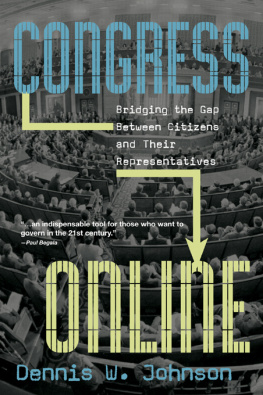Copyright 2015 by Princeton University Press
Published by Princeton University Press, 41 William Street, Princeton, New Jersey 08540
In the United Kingdom: Princeton University Press, 6 Oxford Street, Woodstock, Oxfordshire OX20 1TW
press.princeton.edu
All Rights Reserved
Library of Congress Cataloging-in-Publication Data
Grimmer, Justin.
The impression of influence : legislator communication, representation, and democratic accountability / Justin Grimmer, Sean J. Westwood, and Solomon Messing.
pages cm
Includes bibliographical references and index.
ISBN 978-0-691-16261-4 (hardcover : alk.paper) ISBN 0-691-16261-1
(hardcover : alk.paper) ISBN 978-0-691-16262-1 (pbk. : alk. paper)
ISBN 0-691-16262-X (pbk. : alk. paper) 1. LegislatorsUnited StatesPublic opinion. 2. Government spending policyUnited StatesPublic opinion. 3. Communication in politicsUnited States. I. Title.
JK1726.G755 2015
328.73dc23
2014010921
British Library Cataloging-in-Publication Data is available
This book has been composed in Sabon
Printed on acid-free paper
Typeset by S R Nova Pvt Ltd, Bangalore, India
Printed in the United States of America
10 9 8 7 6 5 4 3 2 1
Acknowledgments
WHEN SCHOLARS WRITE BOOKS, THEY AMASS DEBTS. W E ARE NO EXCEPTION. We owe much to our wonderful research university, our patient colleagues, dedicated reviewers, studious research assistants, and loving families. Our acknowledgments are a step in settling this debt, but only a small step. Like other scholars before us, we recognize that we still owe much to everyone who contributed to this book.
We wrote this book while at Stanford University, an incredible research environment. Our colleagues steady encouragement, earnest criticism, and sharp insights made this book possible and improved its content. Lisa Blaydes, Adam Bonica, David Brady, David Broockman, Daniel Butler, Gary Cox, Lauren Davenport, Kyle Dropp, Jim Fearon, Mo Fiorina, Judy Goldstein, Jessica Gottlieb, Robert Gulloty, Steve Haber, Shanto Iyengar, Simon Jackman, Karen Jusko, Jon Krosnick, David Laitin, Phil Lipscy, Alison McQueen, Clayton Nall, Kristi Olson, Amanda Robinson, Jonathan Rodden, Gary Segura, Paul Sniderman, Jonathan Wand, Rebecca Weiss, Barry Weingast, Arjun Wilkins, and Frannie Zlotnick all deserve special mention for their contributions. The staff in the Department of Political Science were wonderfully helpful. We are especially indebted to Jackie Sargent, Kelly Rosellen, and Eliana Vasquez for their hard work.
We received generous funding from organizations throughout Stanford and beyond to fund our research. This includes support from the Hoover Institution, the Institute for Research in the Social Sciences, the Lab for the Study of American Values, the United Parcel Service Endowment Fund Grant, the Chairs Fund for New Faculty Development, a Google Research Gift, and the Victoria Schuck Faculty Scholar Fund.
Our team of content analysts was fantastic. Molly Cain, Sara Ramsey, and Jack Weller were diligent, thoughtful, hardworking, and patient. This manuscript would not have been possible without them.
Perhaps one of the most productive, and fun, steps in producing a manuscript is presenting nascent ideas to other scholars. The Department of Political Science generously hosted a book conference for our manuscript, and Josh Obers support made the conference possible. The conference attendeesChris Berry, Barry Burden, David Lewis, Arthur Spirling, Mike Tomz, and Rob van Houwelingprovided earnest and productive criticisms that improved our manuscript and refined our argument. Participants in workshops at other institutions helped us to shape this manuscript. This includes workshop participants at Harvard University, Oxford University, University of Rochester, University of California Berkeley, University of Chicago Harris School of Public Policy, Yale University, Emory University, and Ohio State University. We also thank conference participants at the Midwest Political Science Association; the American Political Science Association; Political Methodology Summer Conference; the Northeast Political Methods Meeting; and the Politics, Elections, and Data Workshop. Several scholars from other universities were also kind enough to read and engage with our manuscript, including Avidit Acharya, Matt Blackwell, Amber Boydstun, Anthony Fowler, Andrew Hall, Eitan Hersh, Daniel Hopkins, Gabriel Lenz, Michael Peress, Jas Sekhon, Maya Sen, Brandon Stewart, Hanna Wallach, and John Wilkerson.
The editorial staff at Princeton University Press and the anonymous reviewers contributed greatly to the manuscript. Eric Crahan was extremely supportive of our project. The anonymous reviewers offered careful and fair criticisms of our manuscript. Anonymous reviewers at the American Political Science Review and the editorial team contributed further to our argument. And we thank Cambridge University Press for allowing us to reprint some of the content of How Words and Money Cultivate a Personal Vote: The Effect of Legislator Credit Claiming on Constituent Credit Allocation.
In producing this manuscript, and in our careers, we also amassed our own personal debts to family, mentors, and friends. We dedicate this book to those to whom we owe the greatest debts. Justin can never repay the debt he owes Terese Grimmer, who has been a paragon of dedication, support, and patience, as well as to Izzy, Eli, and Holden, who are a source of constant joy and inspiration. Sean is indebted to Debbie Seltzer-Kelly, a friend and mentor. Solomon owes a tremendous debt to Kathryn, who has been a source of consultation, support, and encouragement, and dedicates this book to her and to their child, whose arrival they eagerly await.
The Impression of Influence
CHAPTER 1
Representation, Spending, and the Personal Vote
THIS IS A BOOK ABOUT HOW POLITICAL REPRESENTATION OCCURS on government spending decisionsone of the most consequential powers of government. The Constitution empowers Congress to pay the Debts and provide for the common Defence and general welfare of the United States. Federal spending has a pervasive influenceimpacting nearly every aspect of American life. How Congress allocates money affects the quality of infrastructure in American cities, the availability of health care in rural towns, and the provision of affordable housing across the country. Spending helps guard against harmhelping local governments prepare for natural disasters, protect against crime and fire, and deter terror attacks. It also sustains a powerful military, a network of federal law enforcement officials, and the flow of commerce and citizens across international borders. Government spending buoys local economies and even supports universities with funding for research.
Political representation in Congress is, in large part, about how elected officials decide how to spend federal money. While a large literature analyzes how district expenditures affect support for congressional incumbents it remains unclear how constituents hold legislators accountable for expenditureshow constituents attribute spending to legislators, how constituents evaluate those expenditures, and how constituents reward or punish legislators for spending on projects.










